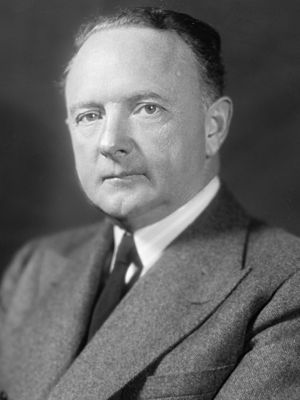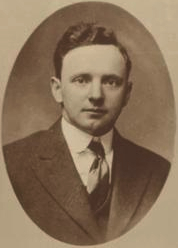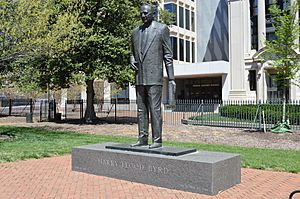Harry F. Byrd facts for kids
Quick facts for kids
Harry F. Byrd
|
|
|---|---|

Byrd, c. 1926–30
|
|
| United States Senator from Virginia |
|
| In office March 4, 1933 – November 10, 1965 |
|
| Preceded by | Claude A. Swanson |
| Succeeded by | Harry F. Byrd Jr. |
| 50th Governor of Virginia | |
| In office February 1, 1926 – January 15, 1930 |
|
| Lieutenant | Junius Edgar West |
| Preceded by | Elbert Lee Trinkle |
| Succeeded by | John Garland Pollard |
| Member of the Virginia Senate from the 26th district |
|
| In office January 9, 1924 – February 1, 1926 |
|
| Preceded by | James M. Dickerson |
| Succeeded by | Joseph S. Denny |
| Member of the Virginia Senate from the 10th district |
|
| In office January 12, 1916 – January 9, 1924 |
|
| Preceded by | Frank S. Tavenner |
| Succeeded by | Marshall B. Booker |
| Personal details | |
| Born |
Harry Flood Byrd
June 10, 1887 Martinsburg, West Virginia, U.S. |
| Died | October 20, 1966 (aged 79) Berryville, Virginia, U.S. |
| Political party | Democratic |
| Spouse |
Anne Douglas Beverley
(m. 1913; died 1964) |
| Children | 4, including Harry Jr. |
| Signature | |
Harry Flood Byrd Sr. (born June 10, 1887 – died October 20, 1966) was an important American politician. He served as the governor of Virginia from 1926 to 1930. After that, he became a U.S. Senator for Virginia, serving from 1933 until 1965.
Byrd was a strong opponent of ending racial segregation in public schools. He led a campaign against the U.S. Supreme Court's decision in Brown v. Board of Education. This decision said that separate schools for different races were not fair.
Contents
Early Life and Family
Harry Flood Byrd was born in Martinsburg, West Virginia, in 1887. His parents were Eleanor Bolling (Flood) and Richard Evelyn Byrd Sr..
Harry's father became a successful apple grower in the Shenandoah Valley. He also owned a newspaper called Winchester Star. Harry went to public schools at first. However, he got most of his education from a private school, the Shenandoah Valley Military Academy, in Winchester.
Marriage and Children
Byrd married Anne Douglas Beverley, a friend from childhood, on October 7, 1913. They first lived in Winchester. In 1916, they moved to a log cabin called Westwood in Berryville, Virginia. This cabin was built from chestnut logs.
The Byrds had three sons: Harry F. Byrd Jr. (1914–2013), Bradshaw Beverley Byrd (1920–1997), and Richard Byrd (1923–2009). They also had one daughter, Westwood Beverly Byrd (1916–1952).
In 1926, Byrd bought Rosemont Manor, a large estate near Berryville. The family moved into this historic mansion in 1929.
Business Ventures
In 1903, Harry Byrd took over his father's newspaper, the Winchester Star. He later bought other newspapers in the Shenandoah Valley. His family owned these papers until 2018.
In 1908, when he was 21, Byrd became the president of The Valley Turnpike Company. This company managed a 93-mile toll road. He also owned many apple orchards and a large apple-packing business.
Political Career in Virginia
In 1915, Byrd was elected to the Virginia Senate. This was the start of his 50 years of public service.
As a state senator, he supported a tax on gasoline. This tax would help pay for building new roads.
In November 1925, he was elected Governor of Virginia. He easily won the election.
Governor of Virginia
Byrd served as governor from 1926 to 1930. During his time, he made changes to the state government. These changes helped the state use tax money more effectively. He also made property taxes a responsibility of local counties.
He started a "pay as you go" system for state spending. This meant that the state would not spend money until enough taxes were collected. Building highways and promoting tourism were his main goals. Roads were built to historic places like Jamestown and Monticello. Historical markers were also placed along roads.
Byrd did not focus much on education. State spending for public schools stayed very low until the late 1960s.
Stance on Segregation
Byrd became a strong supporter of keeping schools separate for different races. He wrote and signed the "Southern Manifesto". This document criticized the 1954 U.S. Supreme Court decision in Brown v. Board of Education. This decision said that separate schools were not equal.
Byrd called for "massive resistance" against school desegregation. This led to many schools in Virginia closing down instead of allowing students of all races to attend together.
National Politics
In 1933, Byrd was chosen to fill an open spot in the United States Senate. He was re-elected as a Democrat many times, serving until 1965.
By the 1950s, Byrd was a very influential senator. He served on important committees, including the Finance Committee. He often voted against bills that would spend a lot of government money. He played a key role in passing the 1964 Revenue Act, which changed tax laws.
Byrd retired from the Senate in November 1965 due to health reasons. His son, Harry F. Byrd, Jr., was appointed to take his place.
Later Life and Legacy
Harry F. Byrd Sr. died in 1966 from a brain tumor. He was 79 years old. He was buried in Mount Hebron Cemetery in Winchester.
One of his biggest achievements was helping to create Shenandoah National Park. He also helped establish the Skyline Drive, the Blue Ridge Parkway, and Virginia's state park system.
A bridge on the Blue Ridge Parkway was named after him in 1985. Part of Virginia State Route 7, a historic road, is also named "Harry Flood Byrd Highway." His former home, Rosemont Manor, is now a bed and breakfast and event venue.
Images for kids




